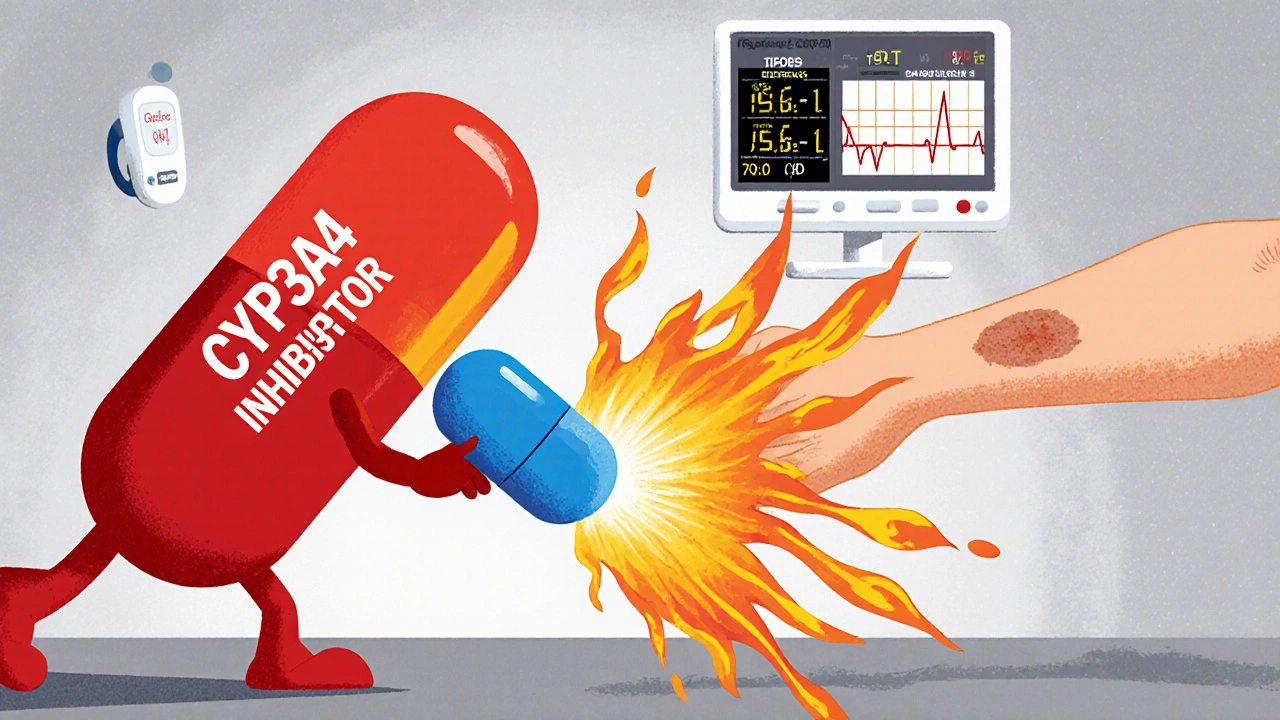Key Takeaways
- Alpelisib is a targeted PI3K inhibitor used for HR‑positive, HER2‑negative breast cancer with a PIK3CA mutation.
- Major safety concerns include hyperglycemia, rash, and QT‑interval prolongation.
- Strong CYP3A4 inhibitors (e.g., azole antifungals) can raise alpelisib levels; dose reduction or avoidance is required.
- Patients should have baseline labs for glucose, liver function, and ECG before starting therapy.
- Regular monitoring and a clear interaction checklist help keep adverse events manageable.
When you or a loved one is prescribed Alpelisib is a selective phosphoinositide 3‑kinase (PI3K) inhibitor approved for hormone‑receptor‑positive, HER2‑negative advanced breast cancer that carries a PIK3CA mutation. Knowing how it interacts with other medicines and what precautions to take can mean the difference between a smooth treatment course and a cascade of side‑effects.
What is Alpelisib and How Does It Work?
Alpelisib belongs to the class of PI3K inhibitors. The PI3K pathway drives cell growth and survival; mutations in the PIK3CA gene keep the pathway permanently “on,” allowing cancer cells to multiply unchecked. By blocking the p110α subunit of PI3K, alpelisib shuts down that signal, slowing tumor growth.
The drug is taken orally, usually once daily, and is prescribed together with endocrine therapy (often fulvestrant). Its effectiveness hinges on the presence of a PIK3CA mutation, which is confirmed by a companion diagnostic test before treatment begins.
Safety Profile: What to Watch Out For
While alpelisib offers a targeted approach, it isn’t free of risks. The most common and clinically significant adverse events include:
- Hyperglycemia - elevated blood sugar, sometimes severe enough to need insulin.
- Rash - can range from mild itching to severe Stevens‑Johnson‑like reactions.
- QT prolongation - lengthening of the heart’s electrical cycle, raising the risk of arrhythmia.
- Diarrhea, nausea, and fatigue - generally manageable with supportive care.
Because many of these effects involve metabolic pathways, drug‑drug interactions are a major concern.

Why Drug Interactions Matter With Alpelisib
Alpelisib drug interactions occur mainly through the cytochrome P450 system, especially the CYP3A4 enzyme. When another medicine either blocks or speeds up CYP3A4, alpelisib’s blood levels can swing dramatically, leading to toxicity or loss of efficacy.
In addition to CYP3A4, alpelisib can affect glucose metabolism, so drugs that also raise blood sugar (like corticosteroids) may compound hyperglycemia. Conversely, strong glucose‑lowering agents such as metformin may need dose adjustments to avoid hypoglycemia when alpelisib induces insulin resistance.
Common Interacting Medications
| Drug | Interaction Type | Potential Effect | Management |
|---|---|---|---|
| Ketoconazole (azole antifungal) | Strong CYP3A4 inhibitor | ↑ Alpelisib exposure → higher toxicity risk | Avoid; if unavoidable, reduce alpelisib dose by 50% |
| Ritonavir (HIV protease inhibitor) | Strong CYP3A4 inhibitor | Same as above | Same as above |
| St. John’s Wort (herbal inducer) | CYP3A4 inducer | ↓ Alpelisib levels → reduced efficacy | Discontinue herbal supplement |
| Statins (e.g., simvastatin) | Shared metabolic pathway (CYP3A4) | ↑ risk of myopathy | Switch to pravastatin or rosuvastatin |
| Metformin | Glucose‑lowering agent | May mask hyperglycemia | Monitor glucose closely; adjust dose if needed |
| Dexamethasone | Corticosteroid - raises blood sugar | Exacerbates hyperglycemia | Limit dose; increase glucose monitoring |
| Hormonal contraception (combined oral) | Potential QT‑prolonging effect | Additive cardiac risk | Consider non‑hormonal methods or monitor ECG |
Precautions Before Starting Alpelisib
Before the first dose, clinicians should perform a baseline work‑up that includes:
- Fasting blood glucose and HbA1c - to detect pre‑existing hyperglycemia.
- Liver function tests (ALT, AST, bilirubin) - because alpelisib is hepatically cleared.
- Electrocardiogram (ECG) - establishes QT interval baseline.
- Medication reconciliation - identify CYP3A4 inhibitors/inducers, QT‑prolonging drugs, and glucose‑altering agents.
If any of these parameters are abnormal, the physician may delay therapy, adjust doses, or select an alternative regimen.
Managing Side Effects During Treatment
Active monitoring keeps problems from spiralling:
- Glucose control: Check fasting glucose weekly for the first month, then monthly. Initiate metformin or insulin if levels exceed 160mg/dL.
- Rash: Apply moisturizers; for grade2+ rashes, add antihistamines or low‑dose steroids.
- QT monitoring: Repeat ECG after two weeks; if QT>500ms, consider dose reduction or discontinuation.
- Drug‑interaction vigilance: Re‑assess medication list at each oncology visit. Any new prescription should be screened for CYP3A4 impact.
Patient Checklist: Staying Safe on Alpelisib
- Carry a list of all prescription, OTC, and herbal products you take.
- Report new symptoms right away - especially high blood sugar readings, palpitations, or a spreading rash.
- Never start or stop a medication without talking to your oncology team.
- Keep scheduled lab appointments; bring your latest results to each visit.
- Maintain a healthy diet and regular exercise to help control glucose.
Frequently Asked Questions
Can I take over‑the‑counter pain relievers with alpelisib?
Acetaminophen is generally safe because it does not affect CYP3A4 or QT interval. NSAIDs such as ibuprofen can be used, but watch for stomach irritation if you’re also on steroids.
Do I need to stop my statin while on alpelisix?
Most statins metabolized by CYP3A4 (simvastatin, lovastatin) should be switched to pravastatin or rosuvastatin, which use different pathways. This avoids combined muscle‑toxicity risk.
What if my blood sugar spikes after starting alpelisib?
First, confirm the reading with a repeat test. If confirmed, your doctor may add metformin, increase the dose of existing antidiabetic meds, or start a short‑term insulin regimen. Lifestyle changes (low‑glycemic diet, exercise) are encouraged.
Is alpelisib safe for patients with a history of heart problems?
A baseline ECG is mandatory. If you have a prolonged QT interval or uncontrolled arrhythmia, the oncologist may avoid alpelisib or monitor you very closely with serial ECGs.
Should I avoid grapefruit while on alpelisib?
Yes. Grapefruit juice is a natural CYP3A4 inhibitor and can raise alpelisib levels, increasing the risk of severe side effects.
By understanding the way alpelisib interacts with the body and other medicines, you can work with your healthcare team to keep treatment effective and side‑effects manageable. Stay proactive, keep open communication, and use the checklist above to stay on top of your therapy.


Comments (13)
Sara Werb October 16 2025
Listen up!!! The pharma elite DON'T want you to know that Alpelisib's real purpose is to turn us into lab rats!!! They hide the fact that strong CYP3A4 inhibitors like ketoconazole are actually a secret weapon to control our blood sugar levels!!! The CDC and big pharma are colluding, feeding us sugar spikes while pretending it's a "side effect"!!! Avoid the government‑approved checklist, do your own research, and stay away from any product that claims to "monitor glucose"!!!
Winston Bar October 25 2025
Honestly, all that hype about interaction tables is just marketing fluff – you can take alpelisib with anything and just hope for the best.
Russell Abelido November 2 2025
Reading through this guide feels like stepping into a labyrinth of modern medicine, where every turn reveals a new hidden trap for the unwary.
We are reminded that the human body is not just a collection of biochemical pathways, but a delicate symphony that can be thrown off‑balance by a single discordant note.
Alpelisib, as a targeted PI3K inhibitor, offers hope, yet it also demands respect for the intricate dance between enzymes and hormones.
When a strong CYP3A4 inhibitor like ketoconazole enters the stage, it can amplify alpelisib's potency, turning a gentle melody into a deafening roar of toxicity.
Conversely, an inducer such as St. John’s Wort can mute the drug’s effectiveness, leaving the cancer cells to waltz unchecked.
Remember, hyperglycemia isn’t just a lab value; it’s a signal that the metabolic orchestra is being overdriven, and ignoring it can lead to a cascade of complications.
Patient empowerment comes from vigilant monitoring – checking fasting glucose weekly, keeping a meticulous medication list, and never hesitating to call your care team when something feels off.
Even the most stubborn rash can be tamed with proper skin care, antihistamines, and, if needed, a short course of steroids – but only under medical guidance.
QT prolongation, though rare, is a silent threat; an ECG is your compass in that dark sea of arrhythmia risk.
Every interaction, whether with a statin or a hormonal contraceptive, should be weighed like a philosopher weighing the pros and cons of existentialism.
In moments of doubt, breathe, reflect, and remember that you are an active participant, not a passive subject, in your own treatment journey.
Stay curious, stay informed, and never let the jargon intimidate you – knowledge is the most potent antidote to fear.
And if you ever feel overwhelmed, reach out to a support group; shared experiences can turn isolation into solidarity.
Above all, treat your body with kindness, respect its signals, and honor the partnership between you and your oncologist.
Together, you can navigate this complex terrain and emerge stronger. 😊
Steve Holmes November 10 2025
Great summary! I appreciate the clear table of interacting drugs – could we also add information on alternative statins that are safer, like pravastatin or rosuvastatin? Also, it would be helpful to note the typical time frame for QT monitoring after starting alpelisib! Thanks for putting this together!
Tom Green November 18 2025
Hey everyone, just a quick heads‑up: when you’re reconciling meds, make a spreadsheet that includes the drug name, its metabolic pathway, and any dose adjustments you’ve discussed with your doctor. This simple tool can prevent a lot of confusion down the road, especially when new prescriptions pop up.
Rebecca Mitchell November 26 2025
Tell me every supplement you’re on.
Malia Rivera December 4 2025
While the guide sings praises of American pharma, let’s not forget it’s a global game – the same molecules are exported worldwide, and our liberty is at stake when foreign regulators allow shortcuts that we, the proud United States, won’t tolerate.
lisa howard December 12 2025
I have to say, reading through this guide feels like being invited into a secret society where only the initiates are privy to the cryptic rules governing alpelisib, and yet the author dares to spill the beans in such a public forum! The very notion that a simple table can capture the myriad ways a drug interacts with our bodies is, in my opinion, an oversimplification bordering on arrogance! Let me intrude here and point out that the checklist, while useful, fails to address the subtle nuances of herbal supplements that patients love to self‑prescribe, like ginseng or even the ever‑popular turmeric capsules! Moreover, the emphasis on CYP3A4 ignores the reality that many patients are already on polypharmacy regimens that involve multiple pathways, making the predictions even more chaotic! I would also argue that the guidance on glucose monitoring, though thorough, could benefit from a more personalized approach, perhaps integrating continuous glucose monitoring devices for those who can afford them! And why, oh why, is there no mention of the psychosocial impact of these side effects – the anxiety, the depression, the feeling of being a lab rat under constant surveillance! The author should have included a section on mental health resources, because treating cancer is not just about shrinking tumors but also about preserving the soul! Finally, I must protest the lack of discussion about diet; a low‑glycemic, anti‑inflammatory diet could dramatically reduce the burden of hyperglycemia and even improve skin rash outcomes! In short, while the guide is a solid starting point, it leaves out the lived experience of patients navigating a maze of pills, labs, and lingering fears! Let’s hope future updates will fill these gaps and give us the comprehensive roadmap we truly need.
Cindy Thomas December 21 2025
Okay, let’s cut the fluff – you don’t need a 10‑page checklist to avoid a rash. Look, alpelisib’s side effects are predictable; if you keep your blood sugar in check and skip the grapefruit, you’ll be fine. 😒
Kate Marr December 29 2025
Our nation’s doctors deserve the best tools, and this guide gives them exactly that – a clear, no‑nonsense list of interactions so we can keep American patients safe. 🇺🇸💊
Emily (Emma) Majerus January 6 2026
Great job! Just remember to check your glucose daily at first – that’ll keep you on track.
Virginia Dominguez Gonzales January 14 2026
Remember, you are not alone in this battle; every lab draw, every ECG, every medication tweak is a step toward victory, and your courage shines brighter than any side effect.
Carissa Padilha January 22 2026
They don’t want you to see the full picture – the pharma lobby hides the fact that alpelisib can interact with common household cleaners, altering its absorption in ways they never publish. Question every label, double‑check every supplement, and never trust the "official" checklist without a second opinion. The truth is out there, guarded by those who profit from our ignorance.